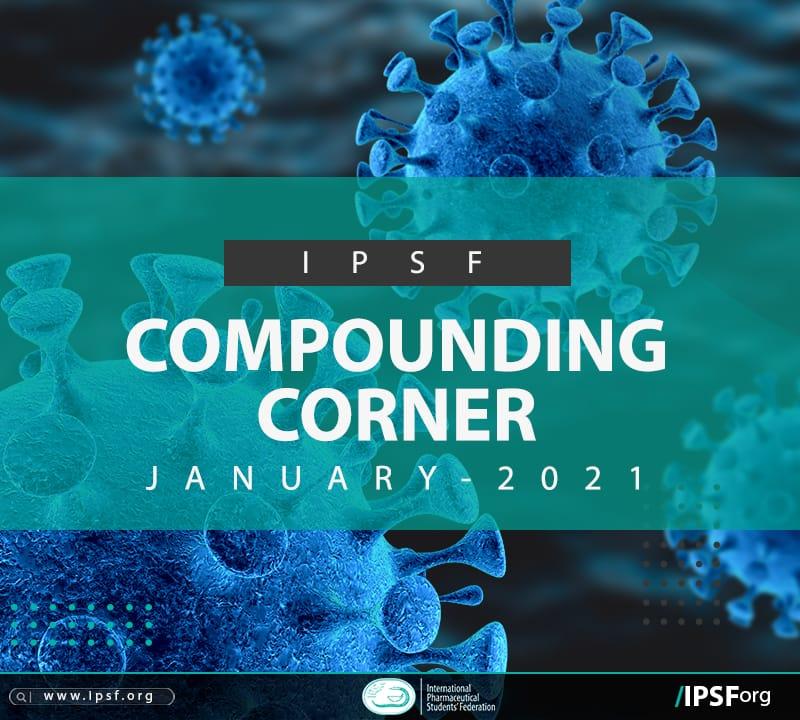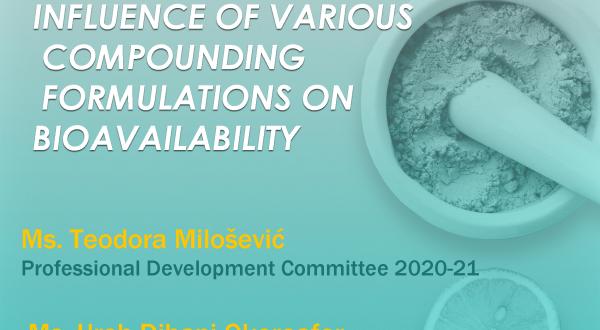
Compounding Pharmacy in the Face of Pandemic
By; Ms. Ureh Dibani Okoroafor
Compounding Event Coordinator 2020-21
With;
Baron Christopher and Shidrokh Kaambakhsh
Professional Development Committee 2020-21
Pandemic
Pandemic is defined as a rapid spread of an infectious disease over a large area, even crossing international borders, and affecting a large number of people within a short period of time. The key concept in the definition of a pandemic is that the disease must be infectious and contagious [1]. Over the past decades, the world has experienced many pandemics, such as cholera, influenza, typhus, malaria, and currently the ongoing HIV/AIDS and corona virus disease 2019 (COVID-19). The unfavorable characteristics of some of these pandemics, especially the influenza, is explained by frequent mutations of the viral genomes and possible reassortment of genetic materials from related viruses in animal hosts, which may permit evasion of the host immune response.
Pandemics usually have a negative effect on the health care systems. For instance, the supply of appropriate chemotherapeutic agents was a serious challenge in the recent influenza pandemic. These concerns are not exceptional within the pharmaceutical industry because they are encountered on a daily basis by large and specially trained teams.
Compounding pharmacies are conventionally engaged in the preparation of medical prescriptions and specialty drugs in small scale. Fortunately, over time scientists are able to find the cure for these pandemics, hence they (pharmacists) had stopped the preparation of medicines in small-scales and we only have to learn them through our textbooks or social media. However, some are still ongoing and researchers from different fields are currently working on to find the cure, to end those pandemics.
Drug Shortage
One of the effects of pandemics is the possibility of drug shortages. The two main causes of drug shortages are decrease in manufacturing capacity and imbalance in supply/demand [2]. The fact that most countries currently encourage the stay-at-home order as a means of curbing the spread of the virus (SARS-CoV-2) has reduced the number of people in the workplace during working hours this influencing the quantity of drugs manufactured. Less people to work mean less drugs to be produced. With the current pandemic, the demand for essential drugs is high, however the supply is limited due to the reduction in pharmaceutical company's manufacturing capacity. Now this is where the Compounding Pharmacy can play a major role.
According to the CEO of International Academy of Compounding Pharmacists (IACP), the role of compounding pharmacists have been widened and one of them is to ensure the continuous availability of drugs to the patients [3]. This is because the Pharmacists have the authority/knowledge to compound commercial drugs as long as the pharmacy has the required ingredients. However, pharmacists must be careful when compounding those drugs, bearing in mind the rational use of the drugs, since one of the main causes of drug shortage; manufacturing, not only affects the production of the drug itself but also the active pharmaceutical ingredients (APIs).
Hygiene and Safety
Compounding Pharmacy can play a part in minimising some of the unfavorable effects of the pandemic by prioritising hygiene and safety throughout their practices. Even though many countries have imposed a ‘stay-at-home’ rule, many people still need to get essential medicines from the pharmacy, so there is a chance that an infected individual may walk into a pharmacy to get their prescribed medicine(s).
Considering the possibility of that, pharmacies have to step up their games in terms of safety precautions; especially compounding pharmacies, where drugs are being made from the scratch. The negligence of safety and hygiene precautions in a compounding pharmacy can result is serious or even deadly consequences. One of the possibilities that can happen is the contamination of raw materials and/or active pharmaceutical ingredients (APIs) where once those contaminated ingredients get compounded into a drug and being sold locally can start a new cluster to spread the virus; even this can create a new outbreak during a pandemic.
The Growth of Telepharmacy
In this modern-day and age, technologies are growing with rapid speed. With the ‘stay-at-home’ rule being imposed by most countries, many people turn to online stores for their needs, they wouldn't need to go out and increase their chances of contracting the virus. The data provided by OECD, between the first and second quarter of 2020 showed that the number of shares of the e-commerce retail sales in the UK increased from 20% to above 30% [4]. This demonstrates a land of opportunities for start-up companies, hospitals, and pharmacies around the world to create a platform for Telepharmacy, therefore moving from a conventional in-store pharmacy to an e-commerce store.
Telepharmacy refers to a form of pharmaceutical care provided by a registered pharmacist using telecommunication, which enables the pharmacist to still provide their care to the patient even when they are not in the same room. In some platform pharmacists are able to obtain important information about the patients that are important for future references. However, for compounding pharmacies, the patient uploads their prescriptions to the platform and have an online consultation with the pharmacist. The drugs are either picked up in the pharmacy or delivered to their home. The benefit of Telepharmacy itself is already apparent from providing a safe and easy way to fulfill patient needs to the prospect of providing easier access for patients in rural areas that may have a limited number of registered pharmacists. . However, Telepharmacy is still a hot topic to discuss as there are some example, some countries still lack regulations regarding this topic, this in turn makes the pharmacist to be wary about their job scope and the legality of this practice in their own country . Other than that, the fear of the possibility of protected health information being compromised in an unfortunate event like hacking, still causes many patients to doubt this platform. To overcome these drawbacks, the pharmacy profession and pharmacy students board has to work hand-in-hand with the government to create a regulation to provide reassurance for the pharmacist and the patient in this amazing and innovative initiative. After all, support from the country itself plays a major role in successfully implementing a new initiative, just like Telepharmacy.
Compounding Pharmacy during COVID-19 Pandemic
All local pharmacies are well aware of the continuous shortages of hydroxychloroquine, chloroquine, albuterol and fluticasone inhalers, and azithromycin.This poses a serious challenge to patients who depend on the above medications for they treatment of their medical conditions. The shortage of medicines has gone beyond the commonly prescribed drugs, but also includes a range of medications used to treat pain, provide anesthesia, prepare IV drugs, and fight bacterial infections in hospitalized patients. Increasingly, even large hospitals and healthcare systems cannot find some medications through their usual channels or outsourcing facilities. Drugs shortages vary widely across states and regions of the world, as many drugs are diverted to areas that are harder hit by COVID-19. Intravenous drugs that help to maintain patients on ventilators, like midazolam and propofol, are particularly affected by supply chain disruptions related to the COVID-19 pandemic.
``In light of unprecedented disruptions to, and demands on, the global pharmaceutical supply chain as a result of the COVID-19 pandemic, and in order to respond to evolving regional conditions, additional flexibility is temporarily needed to ensure that treatment options are available when hospitals are unable to obtain FDA-approved drugs used for hospitalized patients with COVID-19,” the FDA said. Small compounders have been required to have a patient-specific prescription in hand to compound a drug. The loosened guidance removes those restrictions if the pharmacy is compounding one of the drugs on the FDA list. Although Compounders must meet certain conditions to benefit from the enforcement discretion in these guidances.
From all the above, we can see that compounding pharmacies play a very crucial role in pandemics that cannot be overlooked.
Reference
1. Porta M (2008). Dictionary of Epidemiology. Oxford University Press: Oxford. p. 179.
2. ASHP (2020). Drugs shortages. Available at www.ashp.org/drugshortages/summitreport (Accessed on 23/12/2020)
3. DeNoon DJ (2020). What Are Compounding Pharmacies? Available at www.webmd.com/brain/news/20121010/what-are-compounding-pharmacies (Accessed 23/12/2020)
4. OECD (2020). E-commerce in the time of COVID-19. Available at http://www.oecd.org/coronavirus/policy-responses/e-commerce-in-the-time-of-covid-19-3a2b78e8/ (Accessed 26/12/2020)
5. Marin ML, Oliveira BB; Cipriano SL, Suslik CA, Faintuch J (2010).Oseltamivir compounding in the hospital pharmacy during the (H1N1) influenza pandemic. Clinics vol.65 no.11. http://dx.doi.org/10.1590/S1807-59322010001100004
6. US Pharmacist (2020).Compounding Pharmacies Step Into the Breach Created by the Coronavirus Pandemic. Available at https://www.uspharmacist.com/article/compounding-pharmacies-step-into-the-breach-created-by-the-coronavirus-pandemic
7. FDA (2020). Temporary policy for Compounding of Certain drugs for Hospitalised patients by Pharmacy compounders not registered as Outsourcing Facilities during the COVID-19 pandemic Public Health Emergency. Available at https://www.fda.gov/media/137125/download
8. Balick R (2020).APhA coronavirus watch: FDA clarifies compounding rules for drugs in shortage during pandemic. Available at www.pharmacist.com/article/apha-coronavirus-watch-fda-clarifies-compounding-rules-drugs-shortage-during-pandemic



